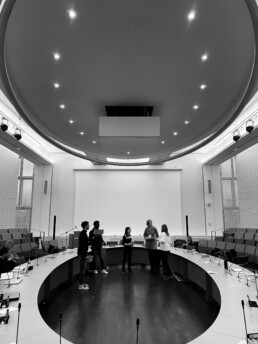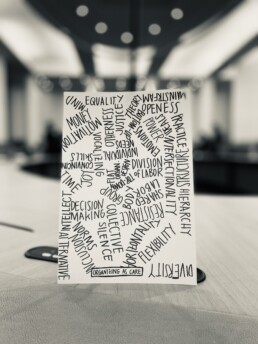PhD Course
Re-inventing Management Education:
Theories, Practices, Interventions in the Anthropocene
Paris, Dauphine-PSL University, 6-8 April 2022 (no registration fees)
The course takes place as a workshop organized in the framework of the European Haniel Program on Entrepreneurship and the Humanities, organized in conjunction with the Haniel Foundation, and will take place in Paris on 6, 7, and 8 April 2022 at the University Paris Dauphine PSL.
The course is coordinated and taught by Antoine Blanc and Véronique Perret (University Paris-Dauphine PSL), with Timon Beyes (Leuphana University Lüneburg), Chris Steyaert (University of St. Gallen) and Robin Holt (CBS).
The course is open for 5 doctoral students from other universities, who will join PhD candidates from the participating universities (Paris-Dauphine, St.Gallen, CBS, Venice, Lüneburg). There is a maximum number of 20 participants.
Registration deadline is February 15th, 2022. Applicants will be chosen on the basis of a CV and a motivation letter also detailing a short reflection on future (or current) teaching practices in management and organization (max. 2 pages).
Please send your application to Robin Holt at MPP: rh.mpp@cbs.dk
After notification of participation, participants are asked to submit a 4-5 pages essay on the future of management education (by March 15th, 2022). This essay may take various forms: a theoretical reflection, an annotated syllabus, the description of an experiment inside/outside the classroom, a business game, a way of hacking institutional structure, etc… The readings suggested below could help you to develop your own ideas.
Thanks to the Haniel Foundation, we can offer free accommodation in Paris; and there is no course fee. Lunches and the closing dinner are also included. Participants are asked to organize their own transport.
In case the ongoing pandemic precludes meeting in Paris, the event will take place online.
Content
What role can management education play against a backdrop of biodiversity depletion, global warming, increasing social and economic precarity? Ecosystems are collapsing in front of our eyes and news of environmental breakdown has become a seemingly endless spectacle. Can management education find a meaningful way to address itself critically in such an atmosphere or is the discipline locked into business as usual? Or is business as usual going to refine and improve itself to the point where it is being offered as a solution the prevailing problems? Or is management practice increasingly outmoded: is it possible to manage anything these days? As management educators we play a special role in developing a language and teaching methods to shape future managers and organizational leaders. This program offers a space for re-thinking and creating new paths for management education against a backdrop of urgency and anxiety consequent upon the economic, social, environmental, and planetary disturbances we are encountering.
In this course we want to come up with collective ways to rethink the roles management education can play building on, or criticising, existing and emerging ideas in the field. We aim at developing ways in which scholars can make a difference, even if they are small.
Participants are expected to engage with both the theory of management education and their own practice or imaginations of teaching. In so doing, the course seeks to open up a space of collective reflection and theorization of management education and to offer new ideas and approaches to the participants’ own pedagogic activities, with regard to both what is being taught and how teaching takes place. The course will therefore draw upon recent theories and debates on management education as well as the participants’ and lecturers’ real-life experiences and ideas of it.
The rationale behind this course is twofold:
First, for most scholars employed at business school departments or management universities, a significant part of their time is spent on preparing teaching and interacting with students. For those who plan on staying in, or close to, academic life, teaching will remain or become an integral part of their work. As university educators, then, we would do well to dwell on the theories that inform our practice, to reflect on our own educational labour and to explore different ways of going about it.
Second, the sheer prominence that the business school and management education has acquired in the last decades lends such an undertaking some urgency. What management education entails, and how it is enacted, has (again) become a matter of profound concern in the field of higher education and, more generally, for the development of the organized world. This concern is closely entangled with big questions concerning what kind of knowledge, practices, sensibilities, and worldviews are conveyed and on offer in the university sector in general and in its business schools in particular. In other words, it is high time to explore how to intervene into management education precisely because the latter is appears so insulated from today’s planetary challenges.
The aims of our endeavour are, at least, fourfold:
- to acquaint ourselves with, digest and discuss key concerns and theories of the history, present and future of management education;
- to reflect on one’s own teaching experience and develop new ideas and potential practices;
- to consider critically how, in management practice, humans have related, and ought to relate, to other species, to the natural environment, to future generations
- to conceive of future aspects of management education, such as concrete courses, didactical practices, spatial and technological innovations etc.
Structure
The course takes place from Wednesday 6 April (from 9am) until Friday 8 April (at 4pm). The basis of the course will be the participants’ essays on theories and practices of education, organized into break-out sessions structure around the themes of the submissions. Convenors and invited speakers will add input on their experience in management education and potential ways to explore new pedagogies in times of the Anthropocene.
In addition, we seek to establish a collective project as a key thread running through the course, jointly working towards a joint manifesto for the management education of tomorrow, which we hope to collectively publish.
This is meant to become a very interactive course equally based on key texts/input statements and the participants’ experiences, concepts and ideas. Therefore, a combination of short mini lectures, break-out sessions and exercises, combined with student presentations and commentary. As a course that aims to re-think management education, we have to start with re-imagining our own participation and education practices.
ECTS awarded (based on audit at Paris-Dauphine): 3 ECTS
Language: English
Literature (indicative)
Steyaert, Chris, Beyes, Timon and Martin Parker, eds. (2016) The Routledge Companion to Reinventing Management Education. London: Routledge.
Banerjee Subhabrata Bobby, Arjaliès Diane -Laure. ‘Celebrating the End of Enlightenment: Organization Theory in the Age of the Anthropocene and Gaia (and why neither is the solution to our ecological crisis)’. Organization Theory. October 2021. https://doi.org/10.1177/26317877211036714
Beyes, Timon and Christoph Michels (2011) ‘The production of educational space’, Management Learning 42(5): 521-536.
Cassiers, Isabelle, Marechal, Kevin and Méda Dominique (2019), Post-Growth Economics and Society. Exploring the Paths of a Social and Ecological Transition, London: Routledge.
Colby, Anne et al. (2011) Rethinking Undergraduate Business Education. San Fransisco, CA: Jossey-Bass.
Dey, Pascal and Chris Steyaert (2007) ‘The troubadours of knowledge: Passion and invention in management education’, Organization 14(3): 437-461.
Huault, Isabelle and Perret, Véronique (2011) ‘Management education as a vehicle for emancipation. Exploring the philosophy of Jacques Rancière’, M@n@gement 14(5): 281-309.
Holt, Robin (2020) ‘Hannah Arendt and the Raising of Conscience in Business Schools.’ Academy of Management Learning and Education 19(4): 584-599.
Jones, Campbell and Damian O’Doherty, eds. (2005) Manifestos for the Business School of Tomorrow. Turku: Dvalin Books.
Latour, Bruno (2018), Down to Earth. Politics in the New Climatic Regime, London: Polity Press.
Moore, Jason, ed. (2016) Anthropocene or Capitalocene? Nature, History, and the Crisis of Capitalism. Oakland: PM Press.
Parker, Martin (2018) Shut Down the Business School. London: Pluto Press.


